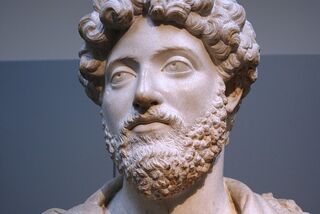Relationships
5 Tips from a Roman Emperor on Living a Good Life
What would Marcus Aurelius do?
Posted August 18, 2021 Reviewed by Tyler Woods
Key points
- What does a Roman emperor have to say about leading a good and happy life that can help us mere mortals who don’t happen to rule an empire?
- To Marcus Aurelius, a key to living a good life comes down to how we think about things.
- Marcus Aurelius says that rather than fear death, we should fear never starting to live.

He was the most powerful human being on the face of the Earth, a Roman emperor whose realm stretched from the Middle East to Britain and the Iberian Peninsula. His name was Marcus Aurelius (b.121 CE; d. 180 CE) and his reign from 161 to 180 CE was marked by a series of conflicts with Germanic tribes along the northern borders of the empire. Though he was a military commander and statesman, he is probably best known to us today as a contemplative thinker who may be closer to the Platonic ideal of the philosopher-king than any other monarch.
Marcus kept a record of his thoughts and reflections, compiled in a work called The Meditations, which is widely considered one of the greatest books in Western Civilization. His thinking was influenced by many philosophers, but especially by those of the Greek school of philosophy called Stoicism, which was practiced and further developed by many Roman thinkers, including Marcus himself, as well as the statesman Seneca and Epictetus, a formerly enslaved Stoic teacher who had a considerable impact on Marcus’s thinking.
Stoicism is a highly evolved system of thought, but among its main precepts is the need to distinguish between what we can control (our thoughts and reactions to events) and what we can’t control (just about everything else) as well as leading our lives in accordance with the natural order of things. Many world leaders were influenced by Stoicism, including several of our founding fathers such as George Washington and Thomas Jefferson.
The Meditations is a collection of personal writings, parts of which read like a self-instructional manual, a guide to living a good and honorable life. It is filled with maxims and short, quotable quips that seem more a recounting of daily reminders Marcus posted to himself than a philosophical treatise. The Meditations touch upon a wide range of subjects, with ideas bouncing around from topic to topic. What Marcus says in The Meditations has value to us today, nearly two millennia since he set down his ideas in writing.
There is much to be mined in The Meditations, but let me share five key ideas that have resonated through time to the present day, cast in the form of the question: “What would Marcus do?”
Don't get too attached to things
“Alexander the Great and his mule driver both died and the same thing happened to both.”
“Remember that very little is needed to make a happy life.”
“Death smiles at us all; all we can do is smile back.”
― Marcus Aurelius
In the Stoic tradition, Marcus reminds us that all life is finite and all that we have accumulated we will eventually surrender unto death. Or as people today might say, we can’t take it with us. Despite their very different stations in life, Alexander the Great and his mule driver wound up in the same place.
The Stoics believed that wealth is better than poverty, so they did not prescribe that we should live an ascetic, bare-bones existence. But we should have a detached attitude toward the things we eventually need to give back and not spend our lives in the vain attempt to collect as many things as possible.
So what counts in the Stoic tradition? One might think in terms of classic values, such as leading a productive life, contributing to society, forming close relationships with friends and family, and finding a place for yourself in the world. Enjoy life, the Stoics might say, but at the end of the day, it’s what you make of your life that counts, not the possessions you accumulate.
Modern psychology backs up Marcus’s claim that happiness does not derive from possessions. True, we may experience a momentary rush of excitement by driving a new car or buying another shiny new object. But after a short while, the allure of the new object fades, along with its shine. It becomes just another thing, and we shift our attention to acquiring yet another new shiny object, only to find that its afterglow soon fades after we acquire it. At a deeper level, it’s the meaningful experiences we share with others that bring true happiness, not the accumulation of objects we once fancied.
Recognize that everything changes, even us
"Observe always that everything is the result of change, and get used to thinking that there is nothing Nature loves so well as to change existing forms and make new ones like them.”
― Marcus Aurelius
Looking at old pictures or videos of yourself can be a sobering experience showing just how much we have changed over the years. We must accept that change is a fundamental fact of life. Many of us struggle to come to terms with the many faces of change—growing old, adapting to new technology and changing social institutions, and so on. We may snicker at middle-aged folks who try to pass as twenty-somethings, but embracing life changes is difficult for many people. One of my patients expressed how she no longer knew herself as she approached middle age. The challenge, of course, is to embrace and come to know who one has become, not to hold on to a fixed image of one’s younger self.
It’s all in how you think about things
“Our life is what our thoughts make it.”
“The happiness of your life depends upon the quality of your thoughts. . . ”
― Marcus Aurelius
Along with other Stoics, Marcus recognized that what affects us are the judgments we make about things, not things themselves. More than a millennium later, William Shakespeare framed the issue squarely when writing in Hamlet, “Things are neither good or bad but thinking makes it so.”
Marcus realized that while we cannot control external events, the power we have over our own mind is a source of strength. He tells us that everything we hear is an opinion, not a fact, and that everything we see is a perspective, not the truth. Knowing these crucial differences means we cannot expect to control outside events, but we can control how we perceive them and how we react to them.
Take, for example, the desire to want others to like us. As understandable as this desire may be, it’s irrational to expect that everyone will pay tribute to our good qualities or approve of everything we do. A running theme I see in my therapy practice is the tendency to base self-worth on what other people do or say, of needing approval from others to be able to approve of oneself. On this point, Marcus’s writing anticipates current approaches to therapy when he quipped that, “It never ceases to amaze me: we all love ourselves more than other people but care more about their opinion than our own.”
Helping patients develop developing assertiveness skills enables them to express their needs and perspectives respectfully, without attacking the other person or fixing blame. But just as importantly comes the recognition that we can’t control how other people respond to us; we can only control what we do and what we say. Since we cannot control what others do, we should not put our self-worth in other people’s hands. Rather, we need to put the “self” back in self-esteem and credit ourselves for what we do, not condemn ourselves for how others may treat or mistreat us. Marcus believed that if someone hurts us or despises us, that’s their problem. Let’s not make it ours. No one else can control your emotions or push your emotional buttons, unless you let them.
Live life in the present
“When you arise in the morning, think of what a precious privilege it is to be alive—to breathe, to think, to enjoy, to love.”
“. . . the longest-lived and those who will die soonest lose the same thing. The present is all that they can give up, since that is all you have, and what you do not have you cannot lose.
“Forget everything else. Keep hold of this alone and remember it: Each of us lives only now, this brief instant. The rest has been lived already, or is impossible to see. The span we live is small—small as the corner of the earth in which we live it.”
― Marcus Aurelius
Tomorrow never comes, nor can it ever be promised. Marcus recognized that the only time we are ever granted in this life is the present, so he encourages us to make the most of it. This doesn’t mean throwing caution to the wind and living only for today. Marcus, like other Stoics, was a practical man, believing in building a life worth living, not indulging in any and all desires or passions of the moment. But he reminds us that life is finite and the span of life is small. Moments pass into hours and then days, never to come again. So yes, Marcus reminds us to be thankful each morning for the privilege of living another day, to think, to enjoy, and to love.
Find your place in the world
“At dawn, when you have trouble getting out of bed, tell yourself: “I have to go to work—as a human being. What do I have to complain of, if I’m going to do what I was born for—the things I was brought into the world to do? Or is this what I was created for? To huddle under the blankets and stay warm?”
― Marcus Aurelius
What do we exist for? Just to take up space and pass through time? To mope about, waiting for our lives to begin? Or to make the most of the time we have. We are members of a family and of a community. We are none of us an island, sufficient unto ourselves. As Marcus wrote, we should not fear death, but we should fear never beginning to live.




